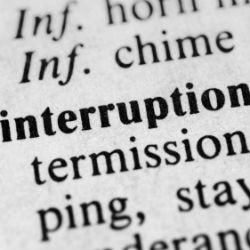
Numerous sources have shown that multitasking, context switching, and interruptions seriously hinder an employee’s productivity. The advice given, including blocking time and batch processing, can help significantly increase the productivity of your workers. However, despite best intentions and clever planning, workplace interruptions are an inevitable part of the business day. Here are some tips to make these interruptions less disruptive and more constructive.
If you’re doing the interrupting, here’s how you can help:
Assess your request.
Start by clearly defining what it is you’re looking for. Is it a simple question, a request for help, or a file you need sent? Is it a project or more complicated task you need help with? Try to define the scope of what you’re looking for. Organizing your thoughts clearly and concisely, including specifically defining what you’re requesting, helps cut to the chase. Saying “I need help finding this month’s budget report” is more effective than saying “I need help with something.”
Determine when you need help.
There are many ways to ask for help, and some ways are more costly than others. Visiting someone’s desk or calling to ask for help is more disruptive than sending an email and awaiting a response. Think through how soon you really need a response (and be sure to include that in your request), and then communicate that request in the most efficient manner. If your request doesn’t need a real-time response, then you should resist the urge to visit or call.
Identify what you’ve already found or tried.
If you’ve already searched through the resources available to you within your organization (or on the web), be sure to include what you’ve already tried. If you haven’t, that’s a great place to start. By sharing what you’ve already looked at you’re helping prevent duplicate work by the person that you’re asking help from.
If you’re on the receiving end of an interruption, here’s what you can do:
Decide if you can meet immediately or if you need to push until later.
You’ve already been interrupted so if you have the time and can discuss the request immediately it may be helpful—at this point, the information is still fresh in the requestor’s mind. If you have other current commitments, make a plan for when you’ll follow up. It can be tempting to make informal statements like “I’ll follow up this afternoon,” but that often leads to you interrupting the requestor when you’re free. Setting a scheduled time allows each of you to prepare to change tasks and approach the discussion fully focused.
Ultimately, interruptions are part the job—but helping minimize their impact should be everyone’s goal. Management can also play a role by triaging requests and only escalating critical interruptions to employees as needed. At the end of day, giving your workers uninterrupted blocks of time to do their best work benefits the entire company.



